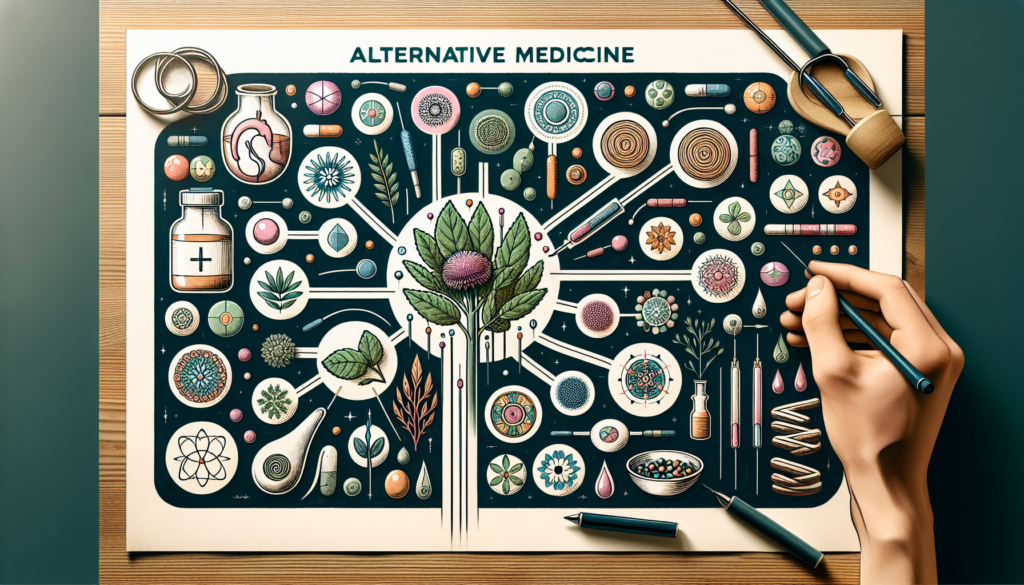In this article, we will explore the fascinating world of alternative medicine. Have you ever wondered what alternative medicine is all about? Well, you’re in the right place because we’re here to shed some light on this topic. From acupuncture to herbal remedies, we’ll uncover the innovative practices and approaches that fall under the umbrella of alternative medicine. So, get ready to broaden your horizons and discover the potential benefits of these alternative healing methods.
Definition of Alternative Medicine
Different interpretations
Alternative medicine refers to a wide range of healing practices, therapies, and treatments that fall outside the realm of conventional medicine. It is often seen as a complement or alternative to mainstream medical practices. However, the exact definition and interpretation of alternative medicine can vary depending on cultural, geographical, and historical factors.
Broad scope
One of the defining characteristics of alternative medicine is its broad scope. It encompasses a plethora of practices and treatments that aim to promote health and well-being. These may include herbal medicine, acupuncture, homeopathy, chiropractic, Ayurvedic medicine, naturopathy, and more. The variety of options allows individuals to explore different approaches and find what works best for them.
Distinct from conventional medicine
Alternative medicine differs from conventional medicine in its principles, philosophies, and methods. While conventional medicine is rooted in scientific research and evidence-based practices, alternative medicine often draws upon ancient traditions, natural remedies, and holistic approaches. It focuses on treating the whole person rather than just the symptoms, and often involves a personalized and individualized approach to healthcare.
History of Alternative Medicine
Ancient origins
The roots of alternative medicine can be traced back to ancient civilizations. Many traditional healing systems, such as Traditional Chinese Medicine (TCM) and Ayurveda, have been practiced for thousands of years. These ancient systems of medicine were based on the belief that the body has the innate ability to heal itself and that health is a result of harmony and balance within the body.
Traditional systems
Throughout history, various traditional systems of medicine developed in different parts of the world. For example, TCM in China, Ayurveda in India, and Native American healing practices in North America. These systems often relied on natural remedies, such as herbal medicines, and employed techniques like acupuncture and massage to restore balance and promote well-being.
Revival in the 20th century
In the 20th century, there was a renewed interest in alternative medicine. This resurgence was influenced by individuals seeking alternatives to the often impersonal and symptom-focused approach of conventional medicine. The rise of holistic and integrative approaches paved the way for alternative medicine to gain recognition and acceptance in mainstream healthcare systems.
Types of Alternative Medicine
Herbal medicine
Herbal medicine, also known as botanical medicine, utilizes plants and plant extracts to prevent and treat various health conditions. Different parts of plants, such as leaves, flowers, roots, and bark, are used to create formulations that can be taken orally, applied topically, or used in other forms such as tinctures or essential oils.
Acupuncture
Originating from China, acupuncture involves the insertion of thin needles into specific points on the body. It is based on the principles of Traditional Chinese Medicine and aims to stimulate the flow of energy, or Qi, throughout the body. Acupuncture is commonly used to alleviate pain, reduce stress, and promote overall wellness.
Homeopathy
Homeopathy is a system of medicine that operates on the principle of “like cures like.” It involves the use of highly diluted substances derived from plants, minerals, or animals to stimulate the body’s healing response. Homeopathic treatments are tailored to the individual’s specific symptoms and aim to restore the body’s natural balance.
Chiropractic
Chiropractic medicine focuses on the diagnosis and treatment of disorders of the musculoskeletal system, particularly the spine. Chiropractors use manual adjustments and other techniques to manipulate the body’s alignment and alleviate pain. This therapy aims to improve overall health by promoting proper spinal alignment and nervous system function.
Ayurvedic medicine
Originating from India, Ayurvedic medicine is one of the world’s oldest holistic healing systems. It emphasizes the balance of mind, body, and spirit to achieve optimal health. Ayurvedic treatments may include herbal medicines, dietary changes, yoga, meditation, detoxification techniques, and more.
Naturopathy
Naturopathy encompasses a variety of natural healing approaches. It emphasizes the body’s ability to heal itself and focuses on treating the underlying causes of disease rather than just the symptoms. Naturopathic practitioners may utilize treatments such as herbal medicine, nutrition, lifestyle modifications, physical therapies, and counseling.
Philosophies and Principles
Holistic approach
One of the core principles of alternative medicine is the holistic approach to health. This means treating the entire person – mind, body, and spirit – rather than just addressing individual symptoms or diseases. Alternative medicine recognizes the interconnectedness of various aspects of a person’s health and well-being and aims to restore balance and harmony in all areas.
Balance and harmony
Alternative medicine often emphasizes the importance of balance and harmony within the body. It believes that illness or disease occurs when there is an imbalance or disruption in the body’s natural state of equilibrium. By addressing the root causes of imbalance and restoring harmony, alternative medicine seeks to promote overall wellness.
Energetic therapies
Many alternative medicine practices incorporate the concept of energy and its flow within the body. Therapies such as acupuncture, Reiki, and Qi Gong focus on channeling and balancing the body’s energy. These energetic therapies aim to remove blockages and restore the smooth flow of energy, resulting in improved health and well-being.

Role of Alternative Medicine
Complementary versus alternative
Alternative medicine is often used in conjunction with, or as a complement to, conventional medical treatments. In this context, it is referred to as complementary medicine. It can be used alongside conventional treatments to address specific health issues, manage symptoms, or promote overall well-being. It is important to note that alternative medicine should not be used as a substitute for necessary conventional medical care.
Promotion of well-being
One of the primary goals of alternative medicine is to promote overall well-being and enhance the body’s natural healing abilities. Alternative medicine takes a proactive approach to health by focusing on prevention and lifestyle modifications. It encourages individuals to take an active role in their own health and make choices that support their well-being.
Focus on prevention
Alternative medicine places significant emphasis on preventive care. Rather than waiting for illness or disease to occur, alternative practitioners advocate for maintaining a healthy lifestyle, addressing imbalances early on, and taking steps to prevent health issues from developing or worsening. This proactive approach aims to keep individuals healthy and thriving.
Effectiveness and Research
Criticism and skepticism
Alternative medicine has faced criticism and skepticism, primarily due to the lack of scientific evidence to support many of its practices and treatments. Critics argue that without rigorous scientific studies and clinical trials, it is difficult to determine the safety and efficacy of alternative medicine approaches. Skeptics also express concerns about potential harm and the proliferation of misleading or false claims.
Limited scientific evidence
While some alternative medicine practices have been scientifically studied and shown promising results, many others lack substantial evidence. The limited scientific evidence is often cited as a reason for caution and skepticism. However, proponents of alternative medicine argue that the holistic nature of these practices can make them difficult to study using traditional scientific methods.
Challenges in research
Research on alternative medicine faces several challenges. Traditional scientific research methodologies may not be well-suited to capture the complex and individualized nature of alternative medicine therapies. Additionally, funding for research in alternative medicine is often limited compared to conventional medicine. Despite these challenges, efforts are being made to conduct rigorous research and generate more evidence for alternative medicine practices.

Regulation and Safety
Regulatory bodies
The regulation of alternative medicine varies from country to country. In some regions, alternative medicine practitioners are subject to licensing, certification, or registration requirements. These requirements aim to ensure that practitioners meet certain standards of education, training, and ethical conduct. Regulatory bodies play a crucial role in protecting the public and ensuring the safety and quality of alternative medicine practices.
Lack of standardized practices
One of the challenges in the regulation of alternative medicine is the lack of standardized practices. Unlike conventional medicine, which follows standardized protocols and guidelines, alternative medicine is often highly individualized and tailored to the specific needs of each patient. This individualization makes it difficult to establish uniform standards and practices across the field.
Safety concerns
While many alternative medicine practices are generally safe, there can be safety concerns, especially when treatments are not administered by trained and qualified practitioners. Some therapies, such as herbal supplements, can interact with medications or have adverse side effects. It is important for individuals considering alternative medicine to seek reliable and reputable practitioners and to inform their primary healthcare providers about any alternative treatments they are using.
Critiques of Alternative Medicine
Lack of scientific basis
One of the main critiques of alternative medicine is the lack of scientific basis for many of its practices. Skeptics argue that without rigorous scientific evidence, it is difficult to assess the effectiveness and safety of alternative therapies. They emphasize the importance of evidence-based medicine and caution against relying solely on anecdotal evidence or personal testimonials.
Potential for harm
Critics also express concern about the potential for harm in alternative medicine practices, especially when they are used in place of necessary conventional medical care. Delaying or avoiding evidence-based treatments in favor of alternative therapies can result in serious health consequences and jeopardize patient outcomes. It is essential for individuals to seek appropriate medical advice and make informed decisions about their healthcare.
Misleading claims
Another critique of alternative medicine is the proliferation of misleading or false claims about its efficacy and benefits. Some practitioners and product manufacturers make exaggerated claims or promote treatments for conditions that do not have sufficient evidence to support their use. This can lead to confusion and misinformation among consumers, making it important for individuals to critically evaluate claims and seek reliable sources of information.

Integration with Conventional Medicine
The rise of integrative medicine
In recent years, there has been a growing interest in integrating alternative medicine with conventional medicine. This approach, known as integrative medicine, seeks to combine the best of both worlds to provide comprehensive and patient-centered care. Integrative medicine aims to bridge the gap between conventional and alternative medicine by incorporating evidence-based practices from both fields.
Collaboration between practitioners
Integrative medicine encourages collaboration and communication between conventional and alternative medicine practitioners. This collaborative approach allows patients to benefit from the expertise and perspectives of different practitioners, creating a more holistic and personalized treatment plan. By working together, practitioners can ensure that patients receive the most appropriate and effective care for their individual needs.
Patient-centered care
Integrative medicine places the patient at the center of their healthcare journey. It recognizes that each individual is unique and has different healthcare needs and preferences. By incorporating alternative medicine into conventional healthcare settings, patients have the opportunity to explore a wider range of treatment options and actively participate in decisions about their health. This patient-centered approach enhances the overall quality of care and patient satisfaction.
Conclusion
Alternative medicine offers a diverse range of practices and treatments that can complement or supplement conventional medical care. It emphasizes a holistic approach to health, focusing on prevention, balance, and individualized care. While the effectiveness of alternative medicine approaches is continually being researched and debated, it is important for individuals to make informed decisions about their healthcare. By consulting with qualified practitioners, seeking reliable information, and working in collaboration with conventional healthcare providers, alternative medicine can be a valuable resource for those seeking a more holistic and personalized approach to their well-being. Ultimately, the choice to explore alternative medicine is a personal one, and understanding the philosophies, principles, and limitations of alternative medicine can empower individuals to make informed decisions for their health and well-being.



